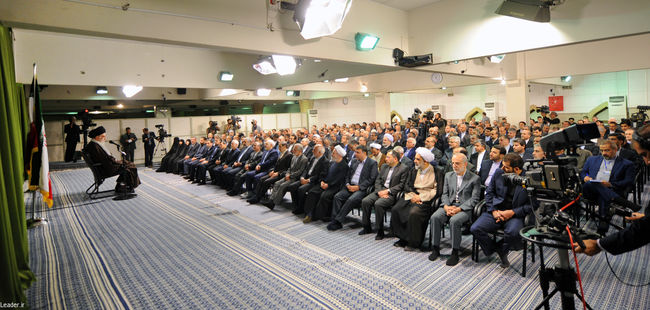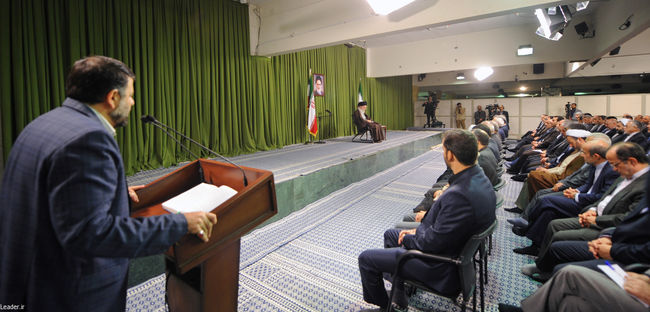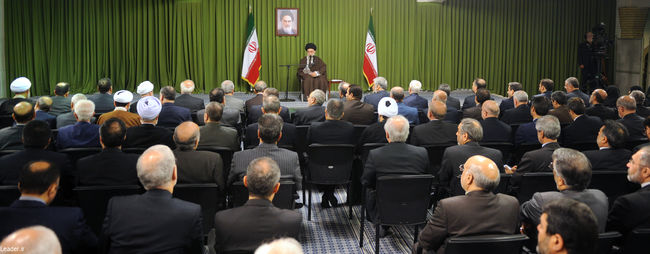Ayatollah Seyyed Ali Khamenei, the Leader of the Islamic Revolution, in a meeting on Sunday with Iranian Foreign Minister Mohammad Javad Zarif as well as the ambassadors and chargés d’affaires representing the Islamic Republic overseas, elucidated the “unwavering and stable foreign policy principles and strategies [enshrined] in the Constitution and the requirements stemming from these principles and policies”. Ayatollah Khamenei outlined the rational and solid-based solutions offered by Iran for important regional issues including Syria, Yemen and Bahrain, saying: “The US’s objectives in the region differ 180 degrees from Iran’s objectives.”
Ayatollah Khamenei said Iran’s foreign policy is the Islamic establishment’s foreign policy incorporated in the Constitution, adding: “This foreign policy is derived from Islam and emanates from the objectives and the ideals of the [Islamic] Revolution, and the Foreign Ministry officials and ambassadors and chargés d’affaires are in fact ‘representatives, soldiers and servants of these principles and ideals’.”
“Like all countries in the world, the country (Iran)’s foreign policy is based on long-term interests and principles and values and does not change with the taking office of administrations with different political attitudes. The administrations are influential on and involved in tactics and executive initiatives of foreign policy strategies,” Ayatollah Khamenei added.
“All tactics of diplomacy in different administrations must serve to push foreign policy principles [enshrined] in the Constitution and Iran’s political representatives overseas should consider themselves as representatives as well as staunch and rational supporters of the [Islamic] establishment’s policies,” said the Leader of the Islamic Revolution.
Touching on the massive propaganda campaign by foreigners about an “obligatory or voluntary shift” in the foreign policy of the Islamic Republic, Ayatollah Khamenei said: “This wishful thinking-based analysis of the Western governments in fact results from the pressure [coming] from the fact that the foreign policy of the Islamic Republic of Iran has, at least at the regional level, served as a fortified bulwark and solid rock preventing domineering powers, particularly the United States, from throwing their weight around, and they are always dreaming of a change in these policies.”
The Leader of the Islamic Revolution referred to the Americans’ policies in the highly sensitive West Asia region as the main reason behind the unstable situation in the region, saying: “Despite certain views, the US constitutes the main part of the problems in the region, not part of a solution to the problems.”
Reiterating that the foreign policy of the Islamic Republic has not been configured by such and such an individual and that it is based on the unswerving principles of the Constitution, Ayatollah Khamenei said: “In the Constitution, Islam sets the criterion for foreign policy. Therefore, taking a stance vis-à-vis different countries and issues must lie within a religious framework.”
Ayatollah Khamenei touched on other principles of foreign policy stipulated in the Constitution, including brotherly commitments to all Muslims in the world, wholehearted support for the oppressed in the world, full negation of colonialism and preventing the infiltration of foreigners in all sectors, safeguarding all-out independence, defending the rights of all Muslims, non-commitment to hegemonic powers, mutually peaceful relations with non-belligerent governments, non-interference in the internal affairs of nations and supporting righteous combats of the oppressed against the oppressors in every spot in the world. The Leader of the Islamic Revolution added: “These appealing, novel and lofty principles have attracted the minds of nations, particularly the elite.”
“The foreign policy of the Islamic Republic of Iran, with such strategies and within such framework, is a revolutionary foreign policy and if it is accompanied by smart approaches it will bring about surprising effects and it enjoys the potential to resolve an important part of problems facing the Muslim world,” Ayatollah Khamenei said.
The Leader of the Islamic Revolution referred to some positive effects of the implementation of foreign policy strategies, saying: “Implementation of revolutionary policies in every field, including diplomacy, will upgrade the [country’s] might and influence and boost the standing of the country as well as the dignity and creditability of Iranians among nations.”
Stressing the constant continuance of unchanging strategies associated with foreign policy, Ayatollah Khamenei said: “We do not claim that we have realized all our objectives or even got closer to them because the implementation of ‘revolutionary foreign policy’ has in practice been accompanied by certain negligence, inefficiency, imprudence and foreign obstacles; however, the current honorable standing of the country owes to these wise policies. Had we not abided by these principles, God knows which strange problems and blows we would have been grappling with within our borders
Summing up this part of this speech, Ayatollah Khamenei stressed to Foreign Ministry officials, ambassadors and charge’s d’affaires: “With firmness and might and honor, repeat the continuation of revolutionary principles and the foreign policy, unswerving strategies, so that foreigners and their followers inside [the country] would not be dreaming of a change in the foreign policy of the Islamic Republic.”
The Leader of the Islamic Revolution went on to speak about the requirements stemming from compliance with the foreign policy principles and strategies.
“Note that the foreign policy tactics must serve the strategic fundamentals and not act against the principles in the name of tactic,” said Ayatollah Khamenei.
The Leader of the Islamic Revolution referred to “self-confidence, frankness and firmness in dealing with opposing factors and obstacles” as other foreign policy requirements, saying: “Of course, the art of diplomacy is that it should express ideas and obstacles in such a way to be influential.”
Ayatollah Khamenei described the Islamic Republic’s logic on regional issues as globally popular and strong. Detailing Iran’s solutions to these issues, the Leader of the Islamic Revolution said: “On the issue of Palestine, while refusing to recognize the usurping and fake [Israeli] regime and strongly condemning the daily atrocities and crimes of this regime, we have suggested elections be held with the presence of all Palestinians, which is fully compliant with the current criteria in the world.”
“Any government that would be born out of the votes of the Palestinian nation will decide the future of Zionists and the residents of occupied territories. Of course, in opposition to our logical proposal, we have been told that it means the collapse of the usurping regime, and it is natural that this fake regime must collapse,” said Ayatollah Khamenei.
Regarding Syria, the Leader of the Islamic Revolution said: “Our words in this domain are the strongest. In our view, there is no point in other countries sitting together and deciding about a governing system and the head of that government. That is a dangerous precedent which no government in the world would want to be subjected to.”
“The solution to the Syria issue is elections and to that effect, war and unrest should first end with a halt to military and financial aid to the dissidents, so that the Syrian people would elect anyone they want in a safe and calm atmosphere,” Ayatollah Khamenei said.
In this regard, the Leader of the Islamic Revolution rejected the idea of the disintegration of countries and their transformation into small-sized ethnic units, saying: “Recognizing one of armed groups as reference for decision-making and the formation of a government is neither logical nor acceptable and such formulas will actually make the war drag on.”
On Iraq, Ayatollah Khamenei said: “Dividing this country into Shia Arab, Sunni Arab and Kurd regions fully disserves people’s interests and is impractical, meaningless and unacceptable.”
“Iraq’s territorial unity, territorial integrity and regarding people’s vote as reference[for decision-making] define the principles of Iran’s solution for Iraq,” said the Leader of the Islamic Revolution.
Referring to Yemen, Ayatollah Khamenei said: “An immediate end to the Saudi crimes and the start of a Yemeni-Yemeni dialog could bring an end to conflicts in this country.”
“The Saudis’ behavior in Yemen and Syria is a flip-flop. Regarding Yemen, they say they have intervened militarily in this country upon the request of the resigned and fugitive president of Yemen, but on Syria, they are not ready to stop supporting armed dissidents upon the request of the legal president of this country,” the Leader of the Islamic Revolution said.
Ayatollah Khamenei also said of the Bahrain issue: “The people of Bahrain want nothing but the right to vote and the right to elect, and we consider this request of theirs as logical.”
After expressing the Islamic Republic’s solutions for resolving the region’s problems, Ayatollah Khamenei said: “The main cause of these insecurities lies in the US support for the Zionist regime and terrorist groups, and these policies differ 180 degrees with the policies of the Islamic Republic.”
The Leader of the Islamic Revolution rejected negotiations with the US about regional issues, saying: “The Americans are seeking to impose their own interests and not to resolve the issues. They want to impose 60, 70% of their demands throughout negotiations and realize and impose the rest of their objectives illegally as well. So what is the point in negotiations?”
Ayatollah Khamenei further elaborated on the continuous development of relations with neighbors as well as Muslim and African countries as other requirements of foreign policy.
The Leader of the Islamic Revolution said the Foreign Ministry officials and staff deserve to be termed combatants and fighters on the international frontline due to their job, adding: “In the light of its objectives and tasks, the Foreign Ministry is satisfactorily active. In particular, during the recent experience of nuclear negotiations, Dr [Mohammad Javad] Zarif (the foreign minister) and his colleagues successfully passed the test.”
Heaping praise on the nuclear negotiating team for its efforts and seriousness, the Leader of the Islamic Revolution said: “Feeling strong and sitting face-to-face with six global powers, defending the objectives and making the other side believe our presence and existence were among the strengths of our country’s negotiators in the nuclear talks.”
Ayatollah Khamenei said piety was the most significant strong point of Mr Zarif, adding: “I constantly pray for you dear [officials].”
“In implementing the JCPOA (Joint Comprehensive Plan of Action), you should follow the important and required points. The realization of these points is possible. As Mr President [Hassan Rouhani] told me achieving some of these results was initially unbelievable, but you resisted and so did we and it became possible,” said the Leader of the Islamic Revolution.
The third and the concluding part of Ayatollah Khamenei’s remarks included pieces of advice and notices for the ambassadors and diplomats of the Islamic Republic of Iran overseas.
“Stabilization of and reliance on the factors of national power and might” including “the outstanding and determining role of people in the country”, “efficient, skilled, young and countless manpower” and “stunning scientific and technological progress”, “deep-seated commitment of ambassadors and diplomats stationed abroad to religious criteria and revolutionary spirit” and “using the potential of Non-Aligned [Movement]’s member countries and contribution to the realization of the Economy of Resistance were among these pieces of advice.
Prior to the address by the Leader of the Islamic Revolution, Dr Zarif, the foreign minister, referring to the sensitive conditions in the region, said: “The instructions and policy lines sketched out by the Leader of the [Islamic] Revolution have been the basis of the Foreign Ministry’s functioning and in the post-JCPOA era, His Excellency’s recent letter addressed to the President regarding the implementation of the JCPOA will set the basis for work.”
Referring to the Foreign Ministry’s attention o the issue of countering infiltration and the implementation of the Economy of Resistance, Dr Zarif said: “In this year’s gathering of ambassadors and charges d’affaires, we will try to benefit from the present circumstances for pushing ahead with the objectives of the Economy of Resistance and strengthening the Axis of [anti-Israel] Resistance in the region and resolving the West Asia problems based on the criteria favored by the Islamic Republic of Iran.”



